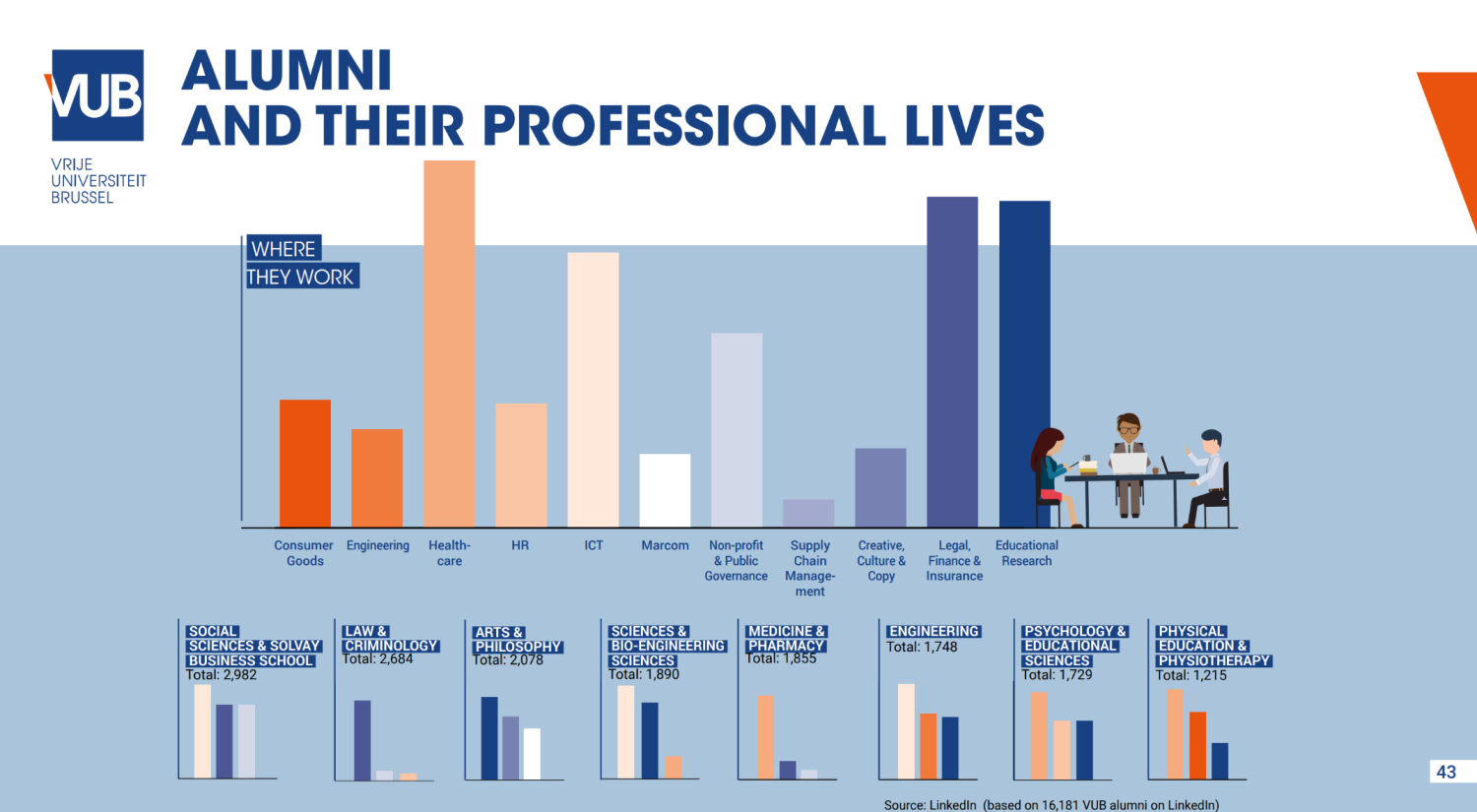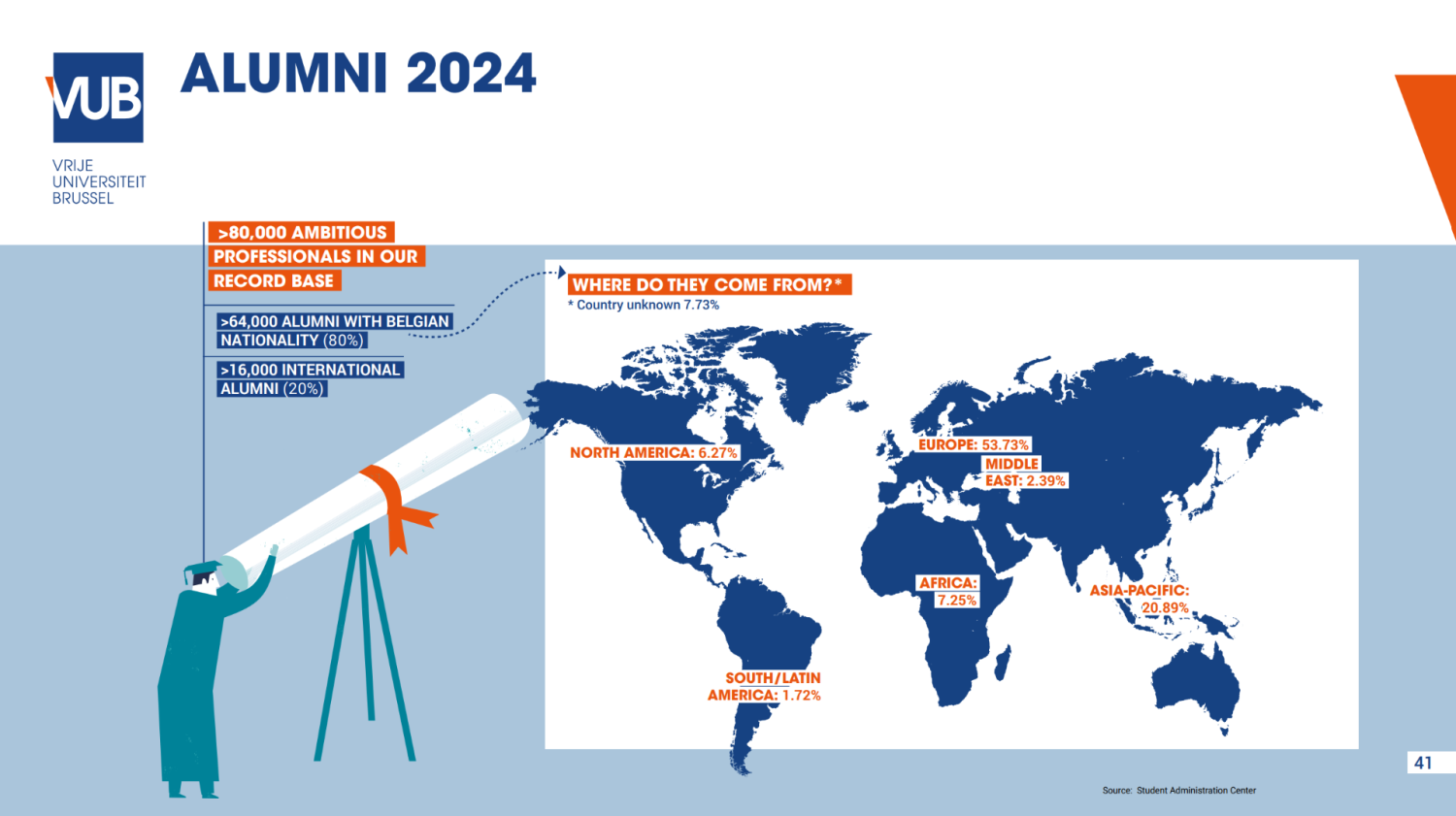
Education, ICT and healthcare dominate, but VUB alumni also strikingly often opt for international and creative careers. Figures from VUB Facts & Figures show how broad the network of former students extends: from EU institutions and NGOs to consultancy and media. The VUB distinguishes itself through its location in Brussels and its international focus, which offers alumni opportunities worldwide.
What do VUB alumni do after their studies? Education and research remain a dominant choice among alumni. These sectors are in the top three for almost all faculties, not only for Science & Bioengineering and Medicine & Pharmacy, but also for Arts & Philosophy, Psychology & Educational Sciences and Physical Education and Physiotherapy. This shows that many alumni aspire to an academic or educational career, despite a labour market that is strongly oriented towards industry.
It is also notable that ICT is no longer exclusively for engineers. It is logical that engineering science graduates end up in ICT, but economics and social sciences and science and bioengineering graduates also mention ICT as a top sector. Digital skills are clearly in demand everywhere.
Healthcare is another sector that recruits more broadly than expected. This is not surprising for Medicine & Pharmacy, but it is striking that alumni from Psychology & Educational Sciences and Physical Education and Physiotherapy are also finding work in healthcare en masse. This emphasises how large and diverse this sector is.
Furthermore, it appears that legal and financial professions are not only popular among Law & Criminology graduates. Alumni of Economic & Social Sciences also find their way into legal affairs, finance and insurance. The overlap between economics and law is greater than is often thought.
Lastly, graduates of Languages & Humanities choose not only education, but also culture and creative sectors, and marketing & communication. This confirms that these programmes are much more versatile than the traditional image suggests.
Looking at all alumni, healthcare remains the largest employer of VUB alumni. Education follows closely, together with legal affairs, finance and insurance. In addition, ICT and technology are growing remarkably fast. Government, non-profit and media complete the spectrum, underlining the versatility of the alumni network.

VUB alumni are more likely to choose international and creative paths
All Flemish universities have a strong representation of their alumni in healthcare, followed closely by education and financial services. VUB distinguishes itself through a more international orientation, a notable presence in media and communication, and strong links with policy and consultancy.
VUB's location in Brussels and the international focus of its programmes give it a unique profile. Alumni are more likely to end up at EU institutions, international organisations and NGOs. We also see a difference in consultancy: where other universities mainly provide traditional business consultancy, VUB alumni often combine this with policy and international projects.

Global network
Not only are the sectors in which VUB graduates find employment diverse, but their geographical distribution is also impressive. Alumni live not only in Belgium, but also in the Netherlands, France and Germany, as well as in North America, Asia and Africa. The map on page 41 of Facts & Figures confirms that VUB has a global community, with strong hubs in Europe and growing networks on other continents.
Top 3 sectors per faculty:
Science & Bioengineering
- ICT
- Education
- Healthcare
Medicine & Pharmacy
- Healthcare
- Education
- Government
Law & Criminology
- Legal affairs, finance and insurance
- Government
- Human resources
Economic & Social Sciences
- ICT
- Legal affairs, financ and insurance
- Government and non-profit
Arts & Philosophy
- Education
- Culture and creative sector
- Marketing and communication
Psychology and Educational Sciences
- Healthcare
- Human resources
- Education
Physical Education and Physiotherapy
- Healthcare
- Consumer goods
- Education
Engineering
- ICT
- Engineering
- Education